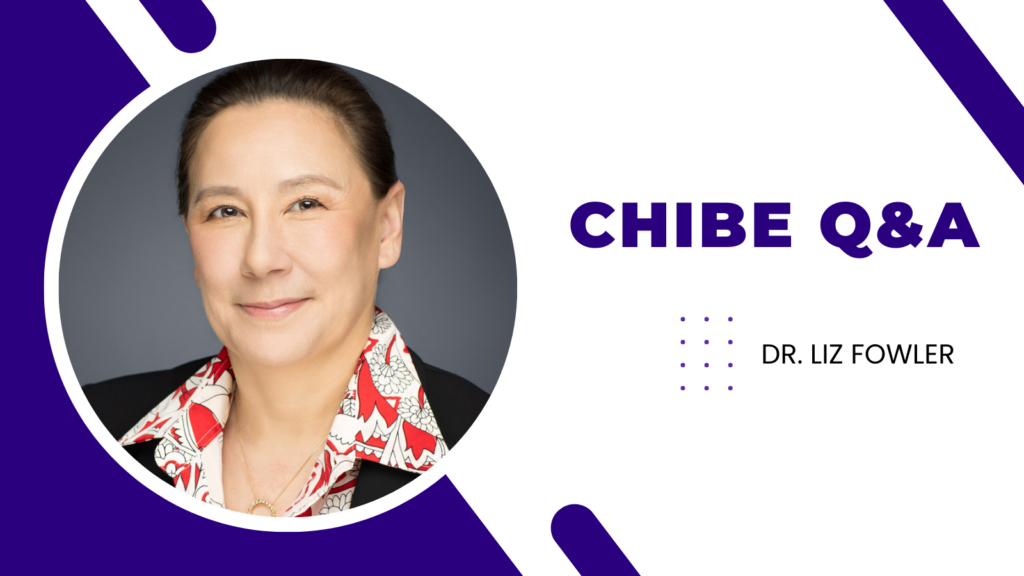CHIBE Q&A with Dr. Liz Fowler

Learn more about one of our center’s newest external advisory board members Liz Fowler, JD, PhD, in our CHIBE Q&A.
What are you working on right now?
Since leaving the CMS Innovation Center in January, I’ve joined the faculty of the Johns Hopkins Bloomberg School of Public Health in the Department of Health Policy and Management as a Distinguished Scholar.
I’ve also launched a (brand) new consulting firm with a former CMS colleague (and fellow Penn grad) Jon Blum – called Health Transformation Strategies.
Both these roles give me the opportunity to stay focused on the big questions: How do we accelerate the shift to value-based care? How do we build a health system that delivers better outcomes, advances health equity – and improves overall sustainability?
I’m excited to help shape the next chapter of health care innovation – using the platform of an academic institution to develop and advance new policy approaches and working with clients in the private sector to translate bold ideas into meaningful change.
What are you most proud of in your career?
I’m most proud of having had the opportunity to shape national health policy in ways that have improved health care for millions of Americans. Whether it was helping to draft and pass the Affordable Care Act, implementing value-based payment models at the CMS Innovation Center, or supporting innovation in the private sector, I’ve consistently focused my career on efforts to make the U.S. health system more equitable, sustainable, and patient-centered. Seeing those policies take root and make a tangible difference — for example, 50 million Americans covered through the ACA since January 2014, and innovation models in value-based care that engaged over 192,000 providers between 2022-2024 — has been deeply rewarding.
How did Penn help you decide on a career in health policy?
I came to Penn as an undergrad planning to go to medical school and become a doctor like my father and grandfather. But everything changed when I took a class on health care systems and learned that the U.S. was the only developed country without a national health system. That fact sparked a deeper interest in the structural and policy-level forces that shape health outcomes — and made me realize that improving the health system at scale could have just as much impact as delivering care one patient at a time.
At that point, I changed my major to History and Sociology of Science with a focus on health care systems, where I had the privilege of learning from influential thinkers like Mark Pauly, Risa Lavizzo-Mourey, Bernie Bloom, Bill Kissick, and Rosemary Stevens. They encouraged me to ask hard questions about how incentives, institutions, and history influence health policy.
That interdisciplinary foundation — combining policy, economics, and behavioral insights — has stayed with me throughout my career. And it’s also why I’m so excited to support CHIBE’s work today!
What interests you about CHIBE? What do you think CHIBE should focus on in the next 5-10 years?
I’ve admired CHIBE’s work at the intersection of health policy, behavioral science, and economics. The center has a unique ability to generate actionable insights that not only deepen our understanding of human behavior but also shape real-world policies and practices that improve health outcomes. What excites me most is CHIBE’s commitment to rigor and policy relevance — producing research that both advances the field and addresses pressing social challenges.
Looking ahead, I believe CHIBE has an opportunity to lead in three key areas over the next decade:
- Health Equity and Structural Barriers: Behavioral economics represent powerful tools for promoting equity, but only if applied with an understanding of the systemic and structural barriers that shape behavior. CHIBE is well-positioned to innovate in this space by designing interventions that are equitable by design — addressing disparities in health care access, the patient care experience, and health outcomes.
- Digital Health and AI Integration: As digital tools, nudges, and algorithms increasingly shape how people interact with the health system, there’s a growing need to ensure these tools are evidence-based and grounded in human-centered design. CHIBE can play a leading role in evaluating and guiding the responsible use of behavioral strategies in digital health, especially as AI enters the equation at a faster rate than any of us could have predicted.
- Behavioral Science in Broader Policy Contexts: CHIBE’s expertise is also highly relevant beyond traditional health care — from food and nutrition policy and climate resilience to financial well-being and social policy. There’s enormous potential to extend the center’s impact by embedding behavioral insights into a broader range of public policies and cross-sector partnerships.
I’m thrilled to contribute to CHIBE’s mission and excited about the opportunity to help shape its next chapter.